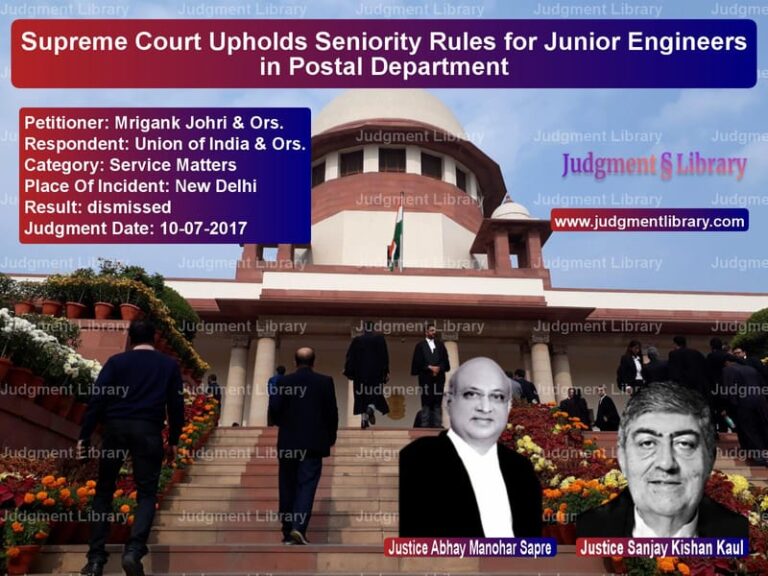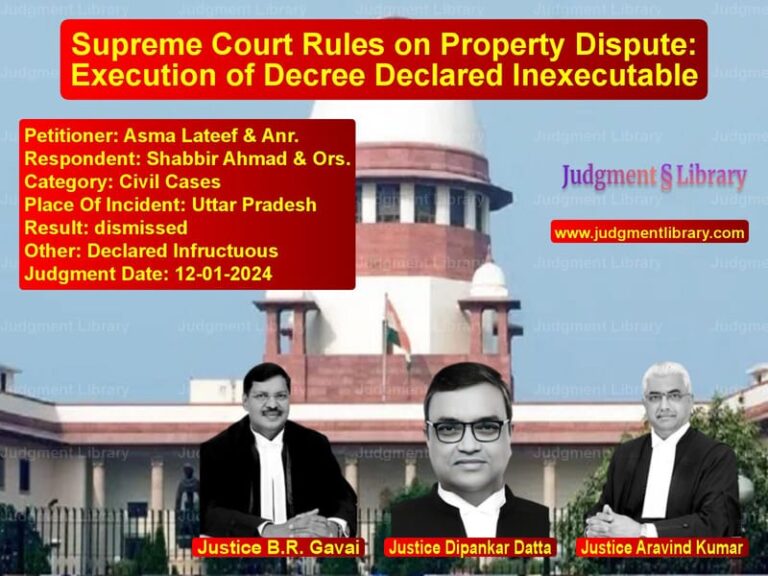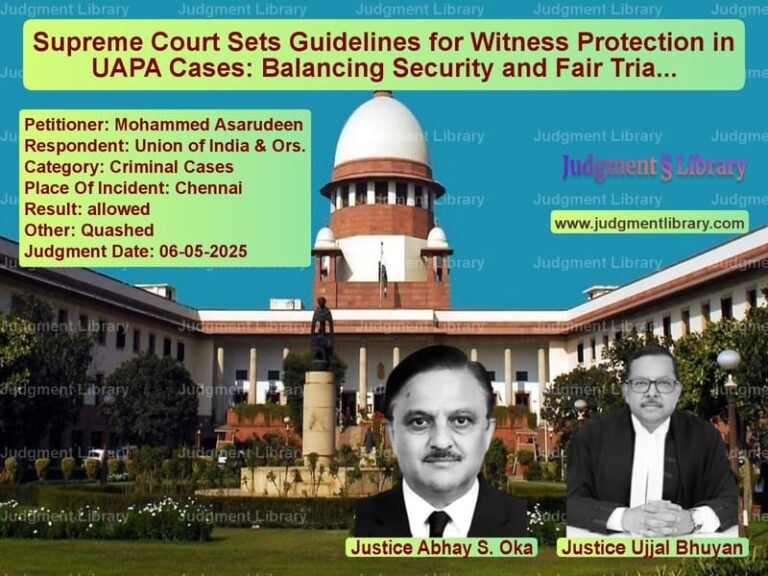Arbitration and Commercial Contracts: Supreme Court Ruling on PSA SICAL vs. V.O. Chidambaranar Port Trust
The Supreme Court of India’s decision in PSA SICAL Terminals Pvt. Ltd. vs. The Board of Trustees of V.O. Chidambaranar Port Trust, Tuticorin & Others is a landmark ruling clarifying the role of arbitration in commercial agreements. The case involved a dispute over tariff fixation and revenue-sharing models in a Build-Operate-Transfer (BOT) project at the V.O. Chidambaranar Port, formerly known as Tuticorin Port.
The Court examined whether an arbitral tribunal had exceeded its jurisdiction by converting the contract’s royalty payment model to a revenue-sharing model. It also determined if changes in government policies constituted a ‘change in law’ that justified modifying the agreement. Ultimately, the Supreme Court upheld the Madras High Court’s decision to quash the arbitral award, ruling that arbitrators cannot rewrite contracts between parties.
Background of the Case
The dispute stemmed from a concession agreement signed in 1998 between PSA SICAL Terminals Pvt. Ltd. (SICAL) and the Board of Trustees of V.O. Chidambaranar Port Trust (TPT) for the development and operation of the Seventh Berth as a container terminal on a BOT basis.
Under the agreement:
- SICAL was required to pay royalty fees per Twenty-foot Equivalent Unit (TEU) to TPT.
- The port tariff was regulated by the Tariff Authority for Major Ports (TAMP), which determined maximum charges SICAL could impose on users.
- Any changes in law that adversely affected SICAL’s rights could justify amendments under Article 14 of the agreement.
The central issue arose when TAMP, following a 2003 directive from the Ministry of Shipping, excluded royalty fees from tariff calculations, making SICAL’s operations financially unviable. SICAL sought relief under the agreement’s ‘change in law’ clause, but TPT refused to amend the contract. SICAL then initiated arbitration.
Petitioners’ Arguments
SICAL contended:
- The 2003 and 2005 government directives preventing royalty inclusion in tariff calculations constituted a ‘change in law’ under Article 14.
- Without factoring in royalty, SICAL’s operational costs exceeded permissible tariffs, making the project financially unsustainable.
- The arbitral tribunal correctly ruled in favor of shifting to a revenue-sharing model to ensure fairness and viability.
- The Madras High Court exceeded its jurisdiction by interfering with a valid arbitral award.
Respondents’ Arguments
The Board of Trustees of TPT countered:
- The contract explicitly required SICAL to pay royalty fees, and no government policy had changed this obligation.
- TAMP’s tariff regulations were independent and did not alter the fundamental terms of the agreement.
- The arbitral tribunal had no authority to rewrite the contract by replacing royalty with revenue sharing.
- The Madras High Court correctly set aside the arbitral award under Sections 34 and 37 of the Arbitration and Conciliation Act, 1996.
Supreme Court’s Observations and Judgment
Arbitral Tribunal Exceeded Jurisdiction
The Supreme Court found that the tribunal’s decision to alter the revenue model was beyond its authority:
“An arbitral tribunal cannot substitute the contractually agreed method of royalty payment with a revenue-sharing model. The tribunal’s role is limited to interpreting the agreement, not rewriting it.”
Change in Law Argument Rejected
The Court ruled that the exclusion of royalty from tariff computation did not qualify as a ‘change in law’:
“The exclusion of royalty from tariff calculations was a regulatory change, not a legislative or contractual amendment affecting the licensee’s rights.”
High Court’s Authority Upheld
The Supreme Court reaffirmed the Madras High Court’s power to set aside the arbitral award:
“Under Section 34 of the Arbitration Act, courts can intervene if an arbitral award is contrary to public policy, beyond jurisdiction, or patently illegal.”
Key Takeaways from the Judgment
- Arbitrators cannot rewrite contracts – They must operate within the agreement’s framework.
- Regulatory changes do not always constitute ‘change in law’ – Only substantive legal amendments can trigger contractual modifications.
- Court oversight in arbitration is limited – But courts can intervene if awards violate public policy or exceed jurisdiction.
- Revenue-sharing and royalty models differ fundamentally – Shifting from one to another alters commercial terms significantly.
Conclusion
The Supreme Court’s ruling in PSA SICAL vs. V.O. Chidambaranar Port Trust reinforces the sanctity of commercial contracts and limits arbitral tribunals from making unilateral changes. The judgment ensures that regulatory bodies like TAMP can function independently while preventing contractual disputes from being misused to alter fundamental business terms.
By upholding the Madras High Court’s ruling, the Supreme Court reaffirms India’s commitment to arbitration while ensuring it remains within legal boundaries.
Petitioner Name: PSA SICAL Terminals Pvt. Ltd..Respondent Name: The Board of Trustees of V.O. Chidambaranar Port Trust, Tuticorin & Others.Judgment By: Justice B.R. Gavai, Justice R.F. Nariman.Place Of Incident: Tuticorin, Tamil Nadu.Judgment Date: 28-07-2021.
Don’t miss out on the full details! Download the complete judgment in PDF format below and gain valuable insights instantly!
Download Judgment: psa-sical-terminals-vs-the-board-of-trustee-supreme-court-of-india-judgment-dated-28-07-2021.pdf
Directly Download Judgment: Directly download this Judgment
See all petitions in Arbitration Awards
See all petitions in Contract Disputes
See all petitions in Dispute Resolution Mechanisms
See all petitions in Commercial Arbitration
See all petitions in Institutional Arbitration
See all petitions in Judgment by B R Gavai
See all petitions in Judgment by Rohinton Fali Nariman
See all petitions in dismissed
See all petitions in Quashed
See all petitions in supreme court of India judgments July 2021
See all petitions in 2021 judgments
See all posts in Arbitration and Alternate Dispute Resolution Category
See all allowed petitions in Arbitration and Alternate Dispute Resolution Category
See all Dismissed petitions in Arbitration and Alternate Dispute Resolution Category
See all partially allowed petitions in Arbitration and Alternate Dispute Resolution Category







